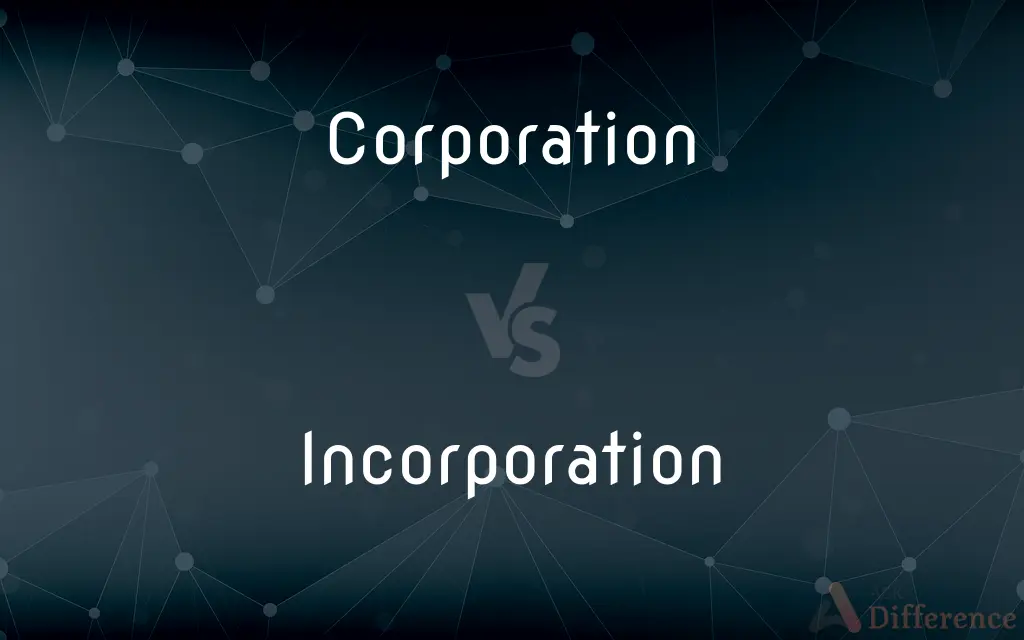Corporation vs. Incorporation — What's the Difference?
By Tayyaba Rehman — Updated on September 23, 2023
A Corporation is a legal entity distinct from its owners, while Incorporation is the process of forming that legal entity.

Difference Between Corporation and Incorporation
Table of Contents
ADVERTISEMENT
Key Differences
A Corporation and Incorporation, while interconnected in terms of business language, have distinct meanings. A Corporation refers to a company or group of people authorized to act as a single entity, legally recognized and separate from its owners. Incorporation, on the other hand, describes the act or process by which a Corporation is created, essentially turning a business into a legally recognized entity.
While the term Corporation generally implies a business structure with shareholders, potential profit distribution, and a set of legal rights, Incorporation revolves around the procedure of obtaining those rights and status. The process of Incorporation typically involves drafting articles of incorporation, submitting requisite documents to a state body, and paying associated fees.
Both Corporation and Incorporation have legal implications. Once a business becomes a Corporation, it's bestowed with certain rights, privileges, and liabilities distinct from its owners. Incorporation, being a process, offers a shield to the business owners, limiting their liability in case the Corporation incurs debt or faces legal action.
Understanding the difference between a Corporation and Incorporation is essential for business owners. While forming a Corporation involves the step of Incorporation, it's the status of being a Corporation that provides the legal benefits, tax implications, and financial structures. In contrast, Incorporation is purely the mechanism to achieve that status.
Comparison Chart
Definition
A legal entity separate from its owners.
The process of forming a legal entity.
ADVERTISEMENT
Nature
Entity
Process
Implication
Has legal rights and responsibilities.
Grants legal rights through formation.
Document associated
Articles of Organization (in some cases)
Articles of Incorporation
Relation to owners
Separate and distinct
A process that distinguishes business from owners
Compare with Definitions
Corporation
A legal entity distinct from its owners.
The Corporation was established in 2005 and has been thriving since.
Incorporation
A legal process bestowing entity status.
Through Incorporation, the business became a distinct legal entity.
Corporation
Recognized by law with specific rights and liabilities.
The Corporation faced a lawsuit last year but was protected by its legal status.
Incorporation
Involves drafting and submitting specific documents.
The articles of Incorporation were submitted to the state's business registry.
Corporation
Can enter into contracts and own property.
The Corporation recently acquired a new office building downtown.
Incorporation
The act of forming a Corporation.
The Incorporation of the company took place in Delaware.
Corporation
A business structure with shareholders.
The Corporation recently paid dividends to its shareholders.
Incorporation
Grants limited liability to company owners.
After Incorporation, the founders were protected from personal liability.
Corporation
Subject to specific taxation rules.
The Corporation benefited from certain tax breaks this fiscal year.
Incorporation
To unite (one thing) with something else already in existence
Incorporated the letter into her diary.
Corporation
A corporation is an organization—usually a group of people or a company—authorized by the state to act as a single entity (a legal entity recognized by private and public law "born out of statute"; a legal person in legal context) and recognized as such in law for certain purposes. Early incorporated entities were established by charter (i.e.
Incorporation
To admit as a member to a corporation or similar organization.
Corporation
An entity such as a business, municipality, or organization, that involves more than one person but that has met the legal requirements to operate as a single person, so that it may enter into contracts and engage in transactions under its own identity.
Incorporation
To cause to merge or combine together into a united whole.
Corporation
Such a body created for purposes of government. Also called body corporate.
Incorporation
To cause to form into a legal corporation
Incorporate a business.
Corporation
A group of people combined into or acting as one body.
Incorporation
To give substance or material form to; embody.
Corporation
(Informal) A protruding abdominal region; a potbelly.
Incorporation
To become united or combined into an organized body.
Corporation
A body corporate, created by law or under authority of law, having a continuous existence independent of the existences of its members, and powers and liabilities distinct from those of its members.
Incorporation
To become or form a legal corporation
San Antonio incorporated as a city in 1837.
Corporation
The municipal governing body of a borough or city.
Incorporation
(Linguistics) To move from the head of one phrase to the head of another, forming a new word by affixing onto that head, as in certain languages when a noun object of a verb is affixed to the verb.
Corporation
(historical) In Fascist Italy, a joint association of employers' and workers' representatives.
Incorporation
Combined into one united body; merged.
Corporation
A protruding belly (perhaps a play on the word corpulence).
Incorporation
Formed into a legal corporation.
Corporation
A body politic or corporate, formed and authorized by law to act as a single person, and endowed by law with the capacity of succession; a society having the capacity of transacting business as an individual.
Incorporation
The act of incorporating, or the state of being incorporated.
Corporation
A business firm whose articles of incorporation have been approved in some state
Incorporation
The union of different ingredients in one mass; mixture; combination; synthesis.
Corporation
Slang terms for a paunch
Incorporation
The union of something with a body already existing; association; intimate union; assimilation.
After the city's incorporation into the capital district, the population rose.
Incorporation
The act of creating a corporation.
Incorporation
A body incorporated; a corporation.
Incorporation
(linguistics) A phenomenon by which a grammatical category forms a compound with its direct object or adverbial modifier, while retaining its original syntactic function.
Incorporation is central to many polysynthetic languages such as those found in North America, Siberia and northern Australia.
Incorporation
(law) A doctrine of constitutional law according to which certain parts of the Bill of Rights are extended to bind individual American states. Wp
Incorporation
The act of incorporating, or the state of being incorporated.
Incorporation
The union of different ingredients in one mass; mixture; combination; synthesis.
Incorporation
The union of something with a body already existing; association; intimate union; assimilation; as, the incorporation of conquered countries into the Roman republic.
Incorporation
The act of creating a corporation.
Incorporation
Consolidating two or more things; union in (or into) one body
Incorporation
Learning (of values or attitudes etc.) that is incorporated within yourself
Incorporation
Including by incorporation
Incorporation
Typically state-specific in the U.S.
The rules of Incorporation vary from state to state.
Common Curiosities
Where is the Incorporation process typically completed?
Incorporation is usually done at the state level in the U.S.
What is a Corporation?
A Corporation is a legally recognized entity separate from its owners.
Can a Corporation be owned by a single individual?
Yes, it's termed a "single shareholder Corporation."
Does a Corporation have the same legal rights as an individual?
To an extent, a Corporation can own property, enter contracts, and sue/be sued.
What does Incorporation mean?
Incorporation is the process of turning a business into a legally recognized entity.
Why might a business seek Incorporation?
To benefit from limited liability, tax advantages, and a professional status.
How does Incorporation impact the owners' liability?
Incorporation generally limits the owners' personal liability regarding business debts.
What's the difference between a Corporation and an LLC?
Both offer limited liability, but they differ in management, tax structures, and regulations.
What are the typical documents required for Incorporation?
Articles of Incorporation and sometimes bylaws.
Does Incorporation influence a company's tax structure?
Yes, Corporations may be taxed differently than sole proprietorships or partnerships.
What are the responsibilities of a Corporation?
Filing annual reports, maintaining records, paying taxes, and following state laws.
Do all countries have the same Incorporation process?
No, Incorporation processes vary from country to country.
Who governs the Incorporation process?
Typically, the Secretary of State or a similar state-level agency.
How long does the Incorporation process typically take?
It varies, but in many U.S. states, it can be completed within a few days to weeks.
Is every business a Corporation?
No, businesses can also be sole proprietorships, partnerships, LLCs, etc.
Share Your Discovery

Previous Comparison
Hyphen vs. Dash
Next Comparison
NAD vs. FADAuthor Spotlight
Written by
Tayyaba RehmanTayyaba Rehman is a distinguished writer, currently serving as a primary contributor to askdifference.com. As a researcher in semantics and etymology, Tayyaba's passion for the complexity of languages and their distinctions has found a perfect home on the platform. Tayyaba delves into the intricacies of language, distinguishing between commonly confused words and phrases, thereby providing clarity for readers worldwide.














































